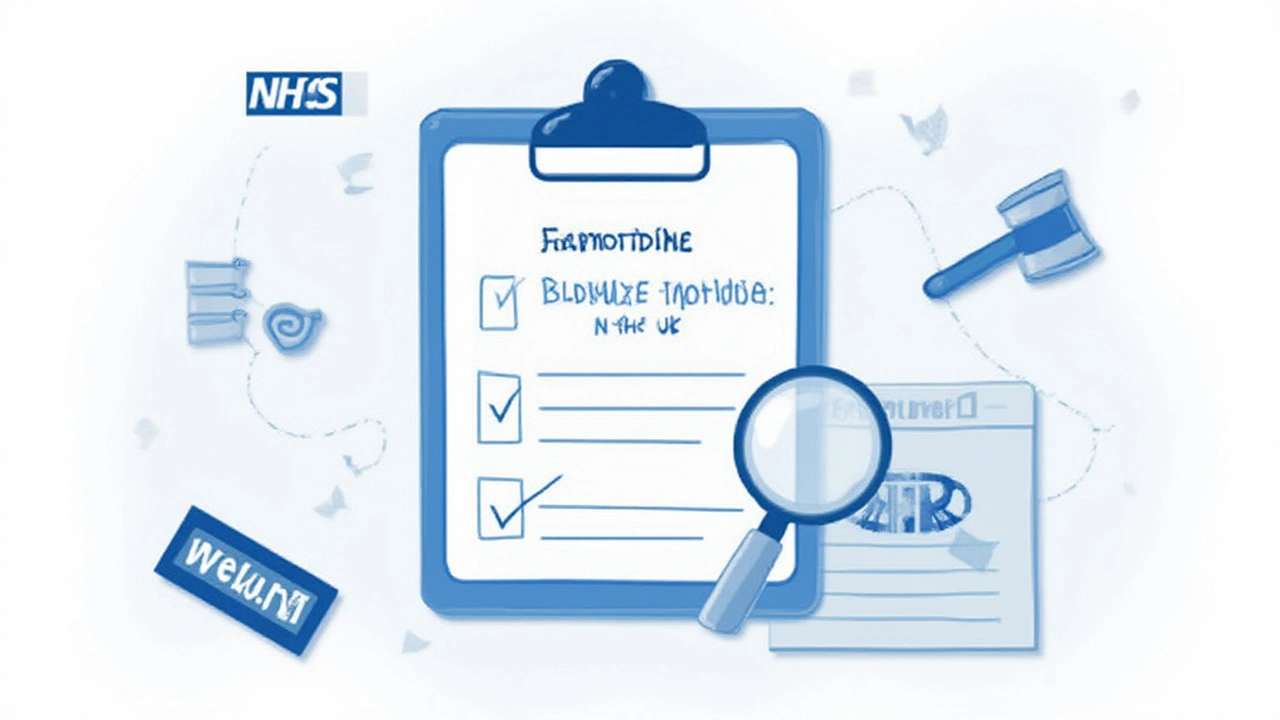Imagine waking up at 2 AM with that familiar burning sensation crawling up your throat. Stomach acid, heartburn, maybe even GERD—these things don’t keep business hours, do they? Famotidine, the little white pill that promises relief, should be as easy to buy as socks. Here’s what most folks never tell you: The world of online meds is a wild mix of game-changing convenience and scary traps. So let’s decode the whole “buying Famotidine online” scene the way people really want—straight, easy, and smart.
What is Famotidine, and Why Do People Buy It Online?
Famotidine is not a brand new player in the heartburn game. It showed up in pharmacies back in the ‘80s under the brand name Pepcid. Now, it’s largely sold as a generic, making it more affordable than those fancy name-brand antacids. Famotidine falls into the group of H2 blockers, which means it dials down the acid production in your stomach. That makes it a go-to solution for folks battling heartburn, indigestion, acid reflux, or even stomach ulcers. Hospitals stocked up on this stuff during the COVID-19 pandemic, when demand spiked after someone suggested it “might” help (turns out, it’s only really proven for acid stuff, not viruses).
Why do so many people start looking for Famotidine online instead of heading to a corner pharmacy? For starters, convenience—day or night, your phone is your pharmacy. But there’s more: online prices can be a lot friendlier, especially if you’re looking for larger packs (think 100 tablets instead of 14 pills in a box). Then comes privacy: not everybody likes discussing their digestive dramas with a stranger at the counter. And if you’re dealing with recurring heartburn, the speed of home delivery means you never have to ration your supply.
Back in 1999, you couldn’t find FDA-approved meds outside of licensed stores. Flash-forward to now—roughly 35% of U.S. adults have bought prescription medication online at least once, and that number is climbing. In 2022, a Statista survey pegged the global online pharmacy market at over $52 billion, doubling since 2017. People trust online pharmacies more than ever, but that trust comes with risks that you don’t want to ignore. “The freedom of pharmacy at your fingertips comes with a responsibility to know who you’re really buying from,” warns Dr. Rachel Myers of Northwestern Medicine.

How to Find Reliable Online Pharmacies for Famotidine
The biggest red flag: anyone selling meds without asking for a prescription or basic health info. Prescription-only? Famotidine walks a line. You can get 10 mg tablets over the counter, but higher doses (like 20 mg and 40 mg) might need a note from your doctor, depending on your country. Always check your local regulations before you click ‘buy.’ The FDA has an updated list of approved safe online pharmacy brands—bookmark it and use it before buying anything that lands in your stomach.
How do you spot a trustworthy online store? Here’s the rundown:
- Look for U.S. FDA, NABP VIPPS, or EU equivalent certifications on the website. These badges mean legit oversight.
- Physical addresses and working customer service lines—not just a random contact form.
- Clear privacy and returns policies, not just hidden in terms and conditions.
- Transparent pricing and shipping policy without vague or suspiciously low costs.
- No fake medication claims like “miracle cures” or “super Famotidine strength, 10x better than doctors give.”
- Ask your own doctor or pharmacist to confirm if a site is safe before that first order.
Avoiding sketchy websites might seem obvious, but every year, Interpol runs Operation Pangea—seizing literally millions of fake pills from unregulated online pharmacies. In the 2023 sweep, over 500 tons of unauthorized medicines were pulled offline globally. Imagine those landing in someone’s mailbox instead of being caught.
Want extra backup? The LegitScript and NABP websites offer quick pharmacy checks, so plug the web address in before trusting a site. Any place that asks for payment with only cryptocurrency or gift cards (instead of credit/debit) is almost always a scam.
An extra tip: stick to recognized online pharmacies connected to brick-and-mortar drugstores. Think CVS, Walgreens, Boots (in the UK), or HealthWarehouse (US mail order). These giants have solid reputations to protect. If your insurance plan covers Famotidine, check whether an online pharmacy is in-network. About 62% of U.S. insurers now have mail-order programs that could save you money and headaches.
Here’s a quick glance at common forms and dosage strengths you’ll see online:
| Dosage | Form | Approximate U.S. Price (2025) |
|---|---|---|
| 10 mg | Tablet (OTC) | $7 - $15 (30 tabs) |
| 20 mg | Tablet (OTC or Rx) | $12 - $25 (30 tabs) |
| 40 mg | Tablet (Rx only) | $24 - $40 (30 tabs) |
| 20 mg/40 mg | Oral suspension | $35 - $60 (400 mL) |
Some pharmacies may offer subscription-type plans for non-prescription strengths, so take a second look at cost if you’re buying in bulk. Just make sure the deal is with a legitimate site, not a random offshore seller whose warehouse could be anywhere.

Buying Famotidine Online: Step-by-Step & Must-Know Facts
The path from “I need relief now” to confidently hitting that ‘buy’ button is pretty simple if you know the flow:
- Double-check your symptoms. Is heartburn happening a lot? Lasting weeks? Time for a chat with your provider—sometimes chest pain is not just about acid. If it’s mild, OTC Famotidine is often fine for short-term use, but say something if it’s daily.
- Decide on your dose. 10 mg and 20 mg tablets are usually sold OTC online. If your doc says you need the higher 40 mg dose or an oral suspension, prepare your digital or paper prescription.
- Pick a pharmacy using legit checks. Use pharma checklists outlined above. Always read recent reviews and see if anyone’s had customer service headaches.
- Fill in your health info honestly. Even if a pharmacy seems to skip questions, tell the truth—especially if you’re on other meds that could interact.
- Order what you need, but resist mega-packs. Bulk can save cash, but pay attention to expiration dates. Famotidine is usually stable for about three years, but heat and moisture speed up decay.
- Check return and refund policies. Most solid US-based online pharmacies offer refunds for damaged or incorrect shipments—something sketchy websites hardly ever do.
- Track your shipment. Trusted pharmacies give tracking, and most ship in discreet packaging for privacy.
- Store your meds right. Famotidine is sensitive to humidity and heat. Keep it dry, out of direct light, and between 59–77°F (15–25°C).
- Keep receipts and order confirmations. This is not just for your records—it’s evidence in case something goes wrong.
- Watch for side effects. Dizziness, headache, muscle pain, or allergic reactions mean stop and call your provider. Even though side effects are rare with over-the-counter use, they happen.
One thing people don’t realize: Famotidine was behind a huge recall wave when a similar drug, ranitidine, was pulled off shelves due to contamination fears. Famotidine passed that storm, and no contamination was found in large FDA-tested batches. According to FDA spokesperson Erica Jefferson,
“We’ve seen no evidence of NDMA contamination in approved batches of Famotidine to date. Our ongoing testing ensures products remain safe for use.”
Famotidine rarely interacts with food, and you can take it with or without meals—that’s a bonus compared to a lot of meds that demand empty stomachs or strict schedules. Heavy alcohol drinking can worsen acid issues, so moderation helps your meds work better.
One danger is thinking more is better. Doubling your dose without medical advice won’t speed up relief—just risks unwanted side effects. Actually, doctors say it’s best to start with the lowest effective dose and only increase if you still have symptoms after a week or two.
Watch out for “international” sites promising crazy-low prices, especially ones that use weird domain endings or ask for bank wire transfers. Medications from unreliable sources might not contain any real Famotidine. They could be contaminated or even outright fakes. If you get tablets that look, smell, or taste different from what you’re used to, compare them to library images on Drugs.com or RxList. Don’t risk it—ask your pharmacist.
Online pharmacies follow strict packaging laws. In the U.S., any prescription shipment must include clear labeling with drug name, dose, your doctor’s info, and pharmacy contact details. If you get plastic bags with loose pills and no insert, that’s a red flag. Report it to your country’s medicines authority—even a single report can help warn others.
If you’re traveling, check customs rules. Some countries (Japan, for example) have strict limits on importing even common meds. Print a copy of your online pharmacy’s invoice and keep your prescription handy in your luggage just in case. Never buy more than a personal-use supply—90 days’ worth is safest for most places.
The short version: online shopping for Famotidine is safe and legal—if you follow the simple ground rules, stick with real pharmacies, and use your own judgment. A few minutes of research can spare you money, time, and very real health risks.



Ariel Munoz
July 23, 2025 AT 19:45Listen up, folks – this isn’t some foreign scheme trying to out‑smart the American healthcare system. If you think grabbing cheap pills from a shady overseas site is a clever hack, you’re just feeding the very predators that threaten our national drug safety. The real heroes are the vetted U.S. pharmacies that keep standards high, and anyone who sidesteps that is jeopardizing American lives.
Ryan Hlavaty
July 24, 2025 AT 23:31It’s ethically unacceptable to sidestep proper medical oversight just because a deal looks cheap. We have a responsibility to ourselves and to society to ensure every medication is sourced responsibly and with a prescription when needed. Cutting corners on something as critical as stomach acid control can lead to dangerous side‑effects and undermines public health.
Chris Faber
July 26, 2025 AT 03:18hey man i get the pride in local pharma but sometimes the best price is legit overseas if you double check the site and read reviews it can work fine
aura green
July 27, 2025 AT 07:05Oh wow, reading this guide felt like attending a masterclass in modern pharmacy espionage, complete with secret handshakes and hidden vaults of cheap pills.
It’s almost charming how many people think they’re outsmarting the system when they’re really just chasing a mirage of savings.
Yet, the good news is that you can actually get legit famotidine without draining your wallet if you follow the sensible steps outlined here.
Just imagine the relief of waking up without that burning throat – pure bliss, right? 😊
Of course, the internet is a wild jungle, and you’ll need a machete of common sense to hack through the scams.
That’s why checking for FDA or NABP badges is non‑negotiable, even if it feels like a bureaucratic pain.
Now, picture yourself ordering from a reputable online pharmacy, tracking the discreet package, and feeling like a savvy adult who actually reads the fine print.
Next, remember that bulk buying can be a double‑edged sword: you save cash but must watch expiration dates like a hawk.
Storing the pills in a cool, dry place is simple, yet many forget this tiny detail and end up with degraded meds.
When you finally pop that tablet and feel the acid calm, the satisfaction is almost cinematic, a true victory over heartburn.
And hey, if you ever spot a sketchy site asking for crypto payments, just walk away – no drama, no loss.
There’s a strange comfort in knowing you’ve navigated the digital pharmacy maze without falling for a counterfeit trap.
Honestly, if more people read guides like this, the market would be purged of a lot of junk faster than a cleaning crew on a tornado‑hit street.
So go ahead, share this wisdom, help your friends, and maybe even start a tiny support group for responsible med‑shopping. 😂
Bottom line: stay informed, stay safe, and let your stomach thank you for the smart choices you make.
Happy pill hunting! 🌟
Edward Morrow
July 28, 2025 AT 10:51Yo, Ryan, spare us the holier‑than‑thou sermon – the market's messy, but calling everyone a health‑terrorist just makes you sound like a bitter old‑timer with a bad case of indigestion.
Shayne Tremblay
July 29, 2025 AT 14:38Stay focused and remember that a little research goes a long way; double‑check certifications, read recent reviews, and keep your prescription handy – you’ve got this, and the right famotidine will be in your hands before you know it!
Stephen Richter
July 30, 2025 AT 18:25One must verify credentials before any purchase.
Musa Bwanali
July 31, 2025 AT 22:11Great point, staying motivated and double‑checking the source is key – keep it up and you’ll avoid the usual pitfalls.
Allison Sprague
August 2, 2025 AT 01:58Firstly, the guide consistently uses “your” instead of “you’re” when advising readers, which is a glaring misuse that could confuse laypeople; moreover, the phrase “miracle cures” should be flagged as hyperbole – it’s not only inaccurate but ethically questionable. While the content is largely helpful, the author’s penchant for run‑on sentences undermines clarity, and the occasional lack of Oxford commas makes the lists harder to parse. In short, tighten the prose, correct the possessive errors, and the guide will resonate far better with an educated audience.
leo calzoni
August 3, 2025 AT 05:45Honestly, the article could have been penned by someone with a fraction of the intellect displayed here; the simplistic language and overuse of buzzwords betray a lack of depth, and readers deserve a more sophisticated treatment of pharmaceutics.
KaCee Weber
August 4, 2025 AT 09:31Hey everyone, I just wanted to say how refreshing it is to see such a thorough breakdown of online famotidine buying – it’s like the community finally decided to upgrade from scattered memes to actual useful knowledge 😊.
From the moment you read about the FDA badge to the tip about discreet packaging, each piece feels like a puzzle piece falling into place.
What really stands out is the emphasis on privacy; nobody wants their stomach drama splashed across a forum, so the discreet shipping note is pure gold.
Also, the reminder about checking expiration dates is something I wish more people remembered, because a stale tablet is as useless as a broken keyboard.
Let’s not forget the part about avoiding crypto payments – that’s a red flag louder than any fire alarm in a pharmacy.
For those of us living abroad, the customs advice is a lifesaver; I’ve seen friends lose entire shipments because they ignored those rules.
And the subscription‑type plan tip? Genius – bulk buys can slash costs, but only if the source is legit, as the guide wisely points out.
I especially love the call to consult your pharmacist, because professional guidance is the ultimate safety net.
All in all, this guide turns a potentially risky venture into a confident, well‑informed process, and I’m thrilled to share it with anyone still wary of the online pharmacy jungle.
Keep the conversation going, spread the word, and let’s make safe med‑shopping the norm! 🌟💊
jess belcher
August 5, 2025 AT 13:18Great points, especially the reminder about customs and crypto – staying informed truly protects us all.